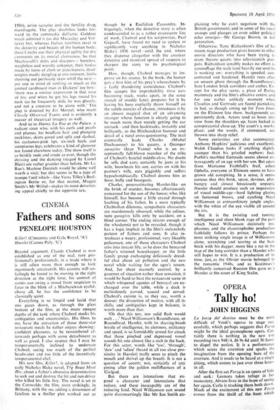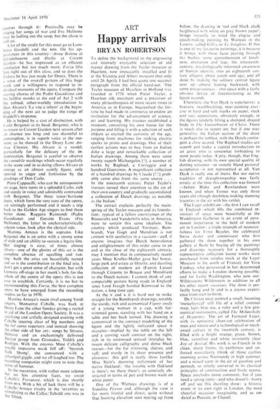OPERA
Tally ho!
JOHN HIGGINS
La forza del destino must be the most difficult of Verdi's operas to stage suc- cessfully, which perhaps suggests that Forza might be the ideal gramophone opera. Cer- tainly there is nothing in the new EMI recording (see 948/4, £6 9s 6d until 30 June) to dispel the notion. It is a performance which seizes the attention and sparks the imagination from the opening bars of the overture. And it needs to be heard at a single sitting, which comes to just over three hours in all.
After the first act Forza is an opera of hide and seek: Leonora takes refuge in her monastery, Alvaro lives in the hope of seeing her again, Carlo is tracking them both down. Much of the excitement of this new Fora comes from the thrill of the hunt which
courses through it: Preziosilla may be singing her songs of war and Fra Melitone may be ladling out the soup, but the chase is still on.
A lot of the credit for this must go to Lam-
berto GardeIli and the RPO. On his ap- pearances in this country—Anna Bolena at
Glyndebourne and Otello at Covent Garden—he has impressed as an efficient conductor but not much more. Forza lifts him right out of this class, and so does the Fedora he has just made for Decca. There is a sense of the overall pattern of this huge work and a willingness to respond to in- dividual moments of the opera. Compare the soaring chorus of the Padre Guardiano and his hellfire monks at the end of Act 2 with the refined, other-worldly introduction to Don Alvaro's 'La vite e infere' at the begin- ning of the next act to judge the range of Gardelli's response.
He is helped by a cast of distinction, with Carlo Bergonzi at its head. Bergonzi, who is to return to Covent Garden next season after an absence too long and too shameful to contemplate, is in superb voice at the mo- ment, as he showed in the Drury Lane An- drea Chenier. His Alvaro is a model, particularly for the delicacy of the in- terpretation. Bergonzi is careful to observe the cantabile markings which occur regularly
in the score and in so doing allows Alvaro to emerge as an almost saintly figure, only spurred to anger and fortissimo by the goadings of Don Carlo.
Piero Cappucilli, who can be unresponsive on stage, here turns in a splendid Carlo, rich and sturdy in voice and admirably contrasted with Bergonzi. The three tenor/baritone duets, which form the very core of the opera, are stirringly performed and it needs a trip back to the Golden Age singers to find them better done. Ruggero Raimondi (Padre Guardiano) and Geraint Evans (Fra Melitone), the latter in uncharacteristically solemn voice, look after the clerical side.
Martina Arroyo is the soprano. Like Bergonzi she is an artist with a strong sense of style and an ability to sustain a legato line. Her singing is easy, at times almost silvery—one of the glories of this set is the complete absence of squalling and ran- ting—both the arias are beautifully turned and so is the contribution to the final trio. I don't get a great sense of character, but with Leonora off-stage in her monk's hole for the whole of the centre of the opera this is not easy to establish. Certainly, it is no bar to recommending this Forza, the best complete opera to have emerged from the recording studios so far in 1970.
Martina Arroyo's main rival among Verdi singers, Monserrat Caballe, was back at Drury Lane the other Sunday giving a recital in aid of the London Opera Society. It was a satisfying and artfully designed evening with Caballe steering clear of big numbers and the bet canto repertory and instead showing the other side of her art: songs by Strauss, Debussy and an enchantingly delivered Iberian group from Granados, Toldra and Rodrigo. With the encores Mme Caballe's usually impassive mask fell off : 'Spanish Volk Shong', she announced with a schoolgirl giggle, and we all laughed too. The recording companies might care to note that sense of humour.
In the meantime, with rather more solemn but no less attentive faces, we await Caballe 's Trovatore, which is due shortly from RCA. With a bit of luck there will be a Caballe/Arroyo rivalry in the 'seventies as stimulating as the Callas/Tebaldi one was in the 'fifties.







































 Previous page
Previous page